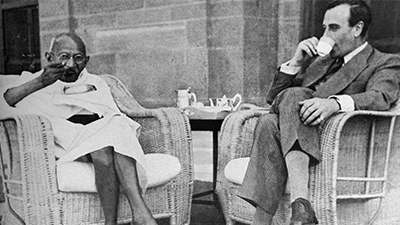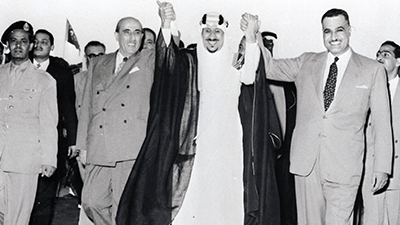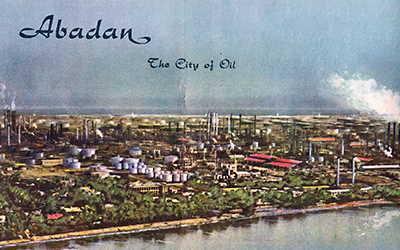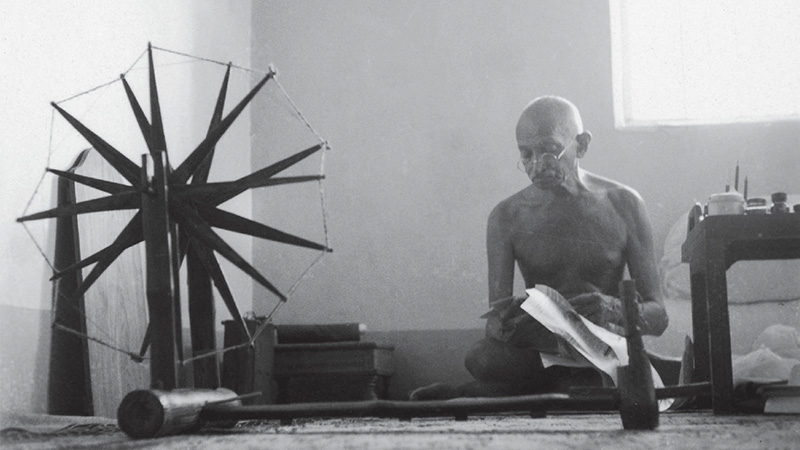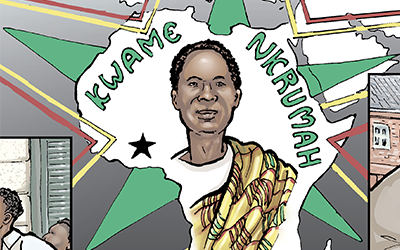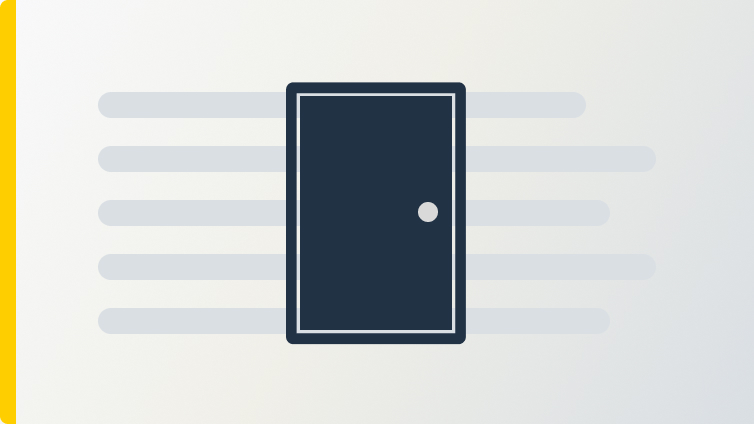Decolonization Around the World
Teacher Resources
Driving Question: What role did the Cold War play in anticolonial movements in Africa, the Middle East, and Asia?
Revolution and global pressure pushed massive changes forward after World War II. This lesson features powerful voices of decolonization often left out of the story for a fuller view of the end of empire.
Learning Objectives:
- Use evidence to evaluate how leaders and communities resisted colonial rule in the context of Cold War power struggles.
- Use a graphic biography to support, extend, or challenge the overarching narratives of this period.
- Create arguments supported by evidence to assess how the Cold War and decolonization are intertwined in the history of this period.
Vocab Terms:
- coup
- decolonization
- dependency
- intervention
- nationalize
- nonviolence
- partition
Opener: Decolonization Around the World
To teach this lesson step, refer to page 2 of the Lesson 8.5 Teaching Guide.
Short on time? Read “Decolonization Case Studies” Which one? in the Community forum for a variety of teacher takes on the topic.
One salty image will help you start to consider the connected struggles for independence and equality in this period.
Comparing Decolonization Struggles
To teach this lesson step, refer to page 3 of the Lesson 8.5 Teaching Guide.
You may want to use the Comparison Tool to help your students keep track of all the decolonization movements they are reading about in this lesson.
By comparing cases like India, Vietnam, Nigeria, and Algeria, you’ll uncover how the global struggle between the United States and Soviet Union influenced local fights for independence—bringing both support and conflict to anticolonial movements.
-
Guiding Questions
-
Before you read
Preview the questions below, and then skim the article. Be sure to look at the section headings and any images.
While you read
Look for answers to these questions:
- What was the necessary condition for a colonized people to end colonial rule? Why?
- What ideologies helped people resist colonial rule?
- How did anti-colonial struggles attempt to change the mindset of their colonizers? What regions were more successful?
- Which of these four nations engaged in violent struggles? Which attempted nonviolence? Were their outcomes different?
- What happened to the nationalist movements’ unity after achieving independence?
After you read
Respond to this question: All four of the nations compared in this article were successful at ending colonial rule and all are independent today. What do you think are the most important similarities among all four that help explain this success?
Decolonization in the Middle East
To teach this lesson step, refer to page 4 of the Lesson 8.5 Teaching Guide.
Check out our Reading Guide to learn about the Three-Step Reading approach.
As Cold War powers competed for influence in the Middle East, nationalist leaders like Nasser and Mossadegh faced new challenges and new opportunities to resist empire.
-
Guiding Questions
-
Before you read
Preview the questions below, and then skim the article. Be sure to look at the section headings and any images.
While you read
Look for answers to these questions:
- Which countries are part of the “Middle East”?
- What was the Sykes-Picot Agreement?
- Why was the Suez Canal so important to imperial powers?
- What did Nasser do that led to a military response from Britain, France, and Israel?
- What actions did Mossadegh take in Iran?
After you read
Respond to this question: Why do you think Nasser succeeded in nationalizing the Suez Canal while Mossadegh was overthrown?
-
Guiding Questions
-
Before you read
Preview the questions below, and then skim the article. Be sure to look at the section headings and any images.
While you read
Look for answers to these questions:
- How did oil shape the economies of many Middle Eastern countries?
- What role did foreign companies play in controlling oil production?
- How did oil wealth affect political power in countries like Iran and Saudi Arabia?
- What actions did OPEC take to influence global oil prices?
- How did oil become a tool in Cold War power struggles?
After you read
Respond to this question: How did control over oil empower some countries and leaders during decolonization while making others more vulnerable to outside influence?
Decolonization in India
To teach this lesson step, refer to page 6 of the Lesson 8.5 Teaching Guide.
Colonized people fought for independence as Cold War rivalries complicated those struggles. In this section, you will see how leaders, revolutions, and wars were shaped by the global battle between capitalism and communism.
-
Guiding Questions
-
Before you read
Preview the questions below, and then skim the article. Be sure to look at the section headings and any images.
While you read
Look for answers to these questions:
- What is meant by an “imagined community”?
- What was Gandhi’s vision for a united India?
- Why was the Amritsar massacre a turning point for the Indian independence movement?
- What is satyagraha?
- How did community actions such as boycotts help challenge colonial rule?
After you read
Respond to these questions: How did Gandhi’s idea of an imagined nation inspire people to fight for independence? What do you think truly defines a nation?
Decolonization in Ghana
To teach this lesson step, refer to page 7 of the Lesson 8.5 Teaching Guide.
For a fresh take on this graphic biography, read Processing the Graphic Bio of Kwame Nkrumah in the Community Forum.
In Ghana, the fight for independence showed how local resistance and Cold War politics were connected. Learn how leaders and grassroots movements challenged colonial rule and shaped a new nation.
-
Guiding Questions
-
Before you watch
Preview the questions below, and then review the transcript.
While you watch
Look for answers to these questions:
- What did historian A. Adu Boahen mean when he said independence was “won by blood”?
- Who was Yaa Asantewaa, and what made her a symbol of resistance?
- What was the Golden Stool, and why did the British want it?
- Why was some resistance directed at local chiefs and kings?
- What role did the UGCC and veterans play in postwar resistance?
After you watch
Respond to this question: Looking through the communities frame, what motivated resistance in Ghana?
-
Guiding Questions
-
Before you read
Preview the questions below, and then skim the comic, paying attention to things like prominent colors, shapes, and types of text and fonts. How do you know where to start and in which direction to read? What’s in the gutters (the space between panels)? Who or what is the focus of the comic?
While you read
- Where was Kwame Nkrumah born?
- Why was Nkrumah’s education in Pennsylvania important?
- Why did Nkrumah believe it was important to support other independence movements?
- How did Nkrumah’s international work contribute to his overthrow?
- How does the artist show Nkrumah’s role in global anticolonialism?
After you read
Respond to this question: How does Nkrumah’s story support, extend, or challenge what you have learned about the Cold War and decolonization?
Closer: Decolonization Around the World
To teach this lesson step, refer to page 11 of the Lesson 8.5 Teaching Guide.
Remind students to use their historical comparison skills as they work through this activity. The Comparison One-Pager can provide a nice refresher on how we approach this skill in the course.
You’ve just learned a lot about decolonization. You could probably write a book, or at least an essay…but let’s start with one page.
Writing: The Cold War and Decolonization
To teach this lesson step, refer to page 11 of the Lesson 8.5 Teaching Guide.
These exercises will help you practice using historical sources to build a strong, evidence-based argument about the global impact of Cold War rivalries on independence movements.
Decolonization Around the World
To teach this lesson step, refer to page 11 of the Lesson 8.5 Teaching Guide.
Colonized people fought for independence as Cold War rivalries complicated those struggles. In this section, you will see how leaders, revolutions, and wars were shaped by the global battle between capitalism and communism.
-
Guiding Questions
-
Before you watch
Preview the questions below, and then review the transcript.
While you watch
Look for answers to these questions:
- What was colonialism like in the Caribbean in the late twentieth century?
- Why did Castro turn to the Soviet Union after the Cuban Revolution?
- How did Puerto Ricans resist US territorial control?
- How has Puerto Rico’s territorial status impacted its people?
- How did Cuba’s revolution influence other Caribbean nations?
After you watch
Respond to this question: How did Cold War rivalries give people in the Caribbean both new opportunities and new challenges?
-
Guiding Questions
-
Before you watch
Preview the questions below, and then review the transcript.
While you watch
Look for answers to these questions:
- What colonial-era events led to the Korean and Vietnam wars?
- Who were the main leaders on each side in Korea and Vietnam?
- What was one major similarity shared by these leaders?
- How was the Vietnam War both a decolonization struggle and a Cold War conflict?
- How was Korea’s experience with decolonization and the Cold War different from Vietnam’s?
After you watch
Respond to this question: Why do you think the United States built normal relations with Vietnam after the war, but remains hostile toward North Korea?


